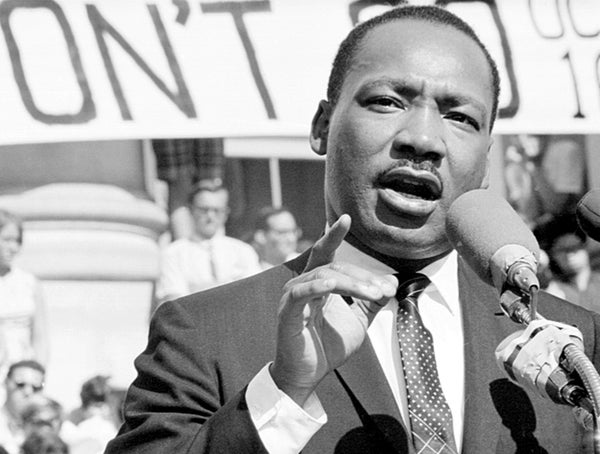This article was published in Scientific American’s former blog network and reflects the views of the author, not necessarily those of Scientific American
Wanting to post something to honor Martin Luther King Day, I searched online for commentary by King on science. I found some examples in a terrific 2012 column by science journalist Cara Santa Maria, who quoted King decrying how science had served the causes of white supremacy and slavery. I also discovered King's 1964 Nobel Peace Prize acceptance lecture, in which he dwells on the gap between our scientific and moral progress. The lecture is worth reading in its entirety, but below are some key excerpts:
"Modern man has brought this whole world to an awe-inspiring threshold of the future. He has reached new and astonishing peaks of scientific success. He has produced machines that think and instruments that peer into the unfathomable ranges of interstellar space. He has built gigantic bridges to span the seas and gargantuan buildings to kiss the skies. His airplanes and spaceships have dwarfed distance, placed time in chains, and carved highways through the stratosphere. This is a dazzling picture of modern man's scientific and technological progress.
"Yet, in spite of these spectacular strides in science and technology, and still unlimited ones to come, something basic is missing. There is a sort of poverty of the spirit which stands in glaring contrast to our scientific and technological abundance. The richer we have become materially, the poorer we have become morally and spiritually. We have learned to fly the air like birds and swim the sea like fish, but we have not learned the simple art of living together as brothers.
On supporting science journalism
If you're enjoying this article, consider supporting our award-winning journalism by subscribing. By purchasing a subscription you are helping to ensure the future of impactful stories about the discoveries and ideas shaping our world today.
"Every man lives in two realms, the internal and the external. The internal is that realm of spiritual ends expressed in art, literature, morals, and religion. The external is that complex of devices, techniques, mechanisms, and instrumentalities by means of which we live. Our problem today is that we have allowed the internal to become lost in the external. We have allowed the means by which we live to outdistance the ends for which we live. So much of modern life can be summarized in that arresting dictum of the poet Thoreau: 'Improved means to an unimproved end.' This is the serious predicament, the deep and haunting problem confronting modern man. If we are to survive today, our moral and spiritual 'lag' must be eliminated. Enlarged material powers spell enlarged peril if there is not proportionate growth of the soul. When the 'without' of man's nature subjugates the 'within.' dark storm clouds begin to form in the world.
"This problem of spiritual and moral lag, which constitutes modern man's chief dilemma, expresses itself in three larger problems which grow out of man's ethical infantilism. Each of these problems, while appearing to be separate and isolated, is inextricably bound to the other. I refer to racial injustice, poverty, and war."
Our survival depends on solving these problems, King said. He added, "The solution of these problems is in turn dependent upon man squaring his moral progress with his scientific progress, and learning the practical art of living in harmony."
King's words remain all too relevant.
